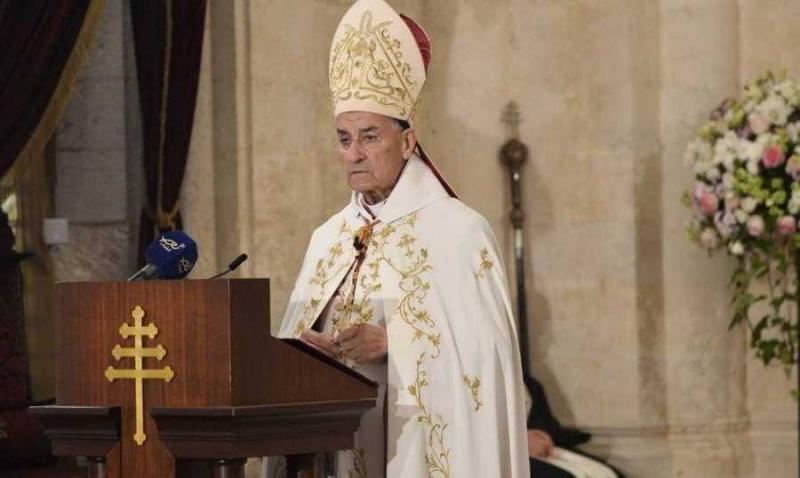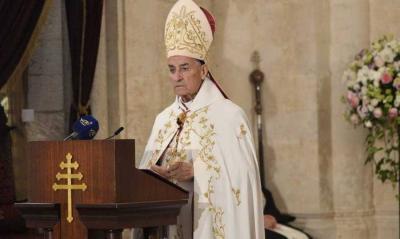The Maronite Patriarch Bechara Al-Rahi affirmed that regarding the presidency, "we do not prefer anyone over anyone else, but we hope for a president who is capable of facing the challenges." Al-Rahi stressed during the conclusion of the Synod of Bishops of the Maronite Church that "we are experiencing moral pain and have been wounded in our national dignity due to the manner in which the presidential election session was halted from its constitutional and democratic course."
Patriarch Al-Rahi presided over the mass concluding the Maronite Church's Synod and the 15th anniversary of the Maronite Foundation for Emigration, held at the Church of Our Lady in the Patriarchal Monastery in Bkerke, with the participation of Apostolic Nuncio Monsignor Paolo Borgia, Chargé d'Affaires Monsignor Giovanni Picari, bishops of the community in Lebanon and the diaspora, general superiors, as well as the honorary president of the Maronite Foundation for Emigration, MP Neemat Afram, the head of the foundation Charles Haj, the president of the Maronite League Ambassador Khalil Karam, the president of the Maronite General Council Michel Matte, and members of the foundation.
After the Gospel, Al-Rahi delivered a sermon in which he stated: "In light of the abnormal political reality Lebanon is undergoing, where its constitutional institutions are collapsing and the people are impoverished and forced to migrate to other countries, carrying their wounds, the Church finds itself deeply wounded in its heart and faith by the Son of God who, through His incarnation and redemption, became close to every human being. It is not right for us as bishops to remain silent about injustices; rather, we must arm ourselves with courage and give voice to those who have no voice, and continually raise the cry of the Gospel in defense of the oppressed in this world, including the threatened, the despised, and those deprived of their human rights."
He added: "While our people are living through economic, financial, social, and humanitarian crises, the electoral session for the presidency last Wednesday, in how it was halted from its constitutional and democratic course, has increased our moral pain and wounded our national dignity, leaving us with a mark of shame upon our foreheads in front of global public opinion, especially as everyone looks to Lebanon with hope for the election of a president to enable it to emerge from its crises."
Al-Rahi concluded by stating, "As for us, we do not prefer anyone over anyone else, but we hope that a president will come who is capable of facing the challenges, the foremost being the construction of internal unity, reviving constitutional institutions, and initiating the necessary and urgent reforms."
### Final Statement: A Call for National Awareness Among Officials
A final statement was issued by the Synod of Bishops of the Maronite Church, which said: "The accumulation of events in Lebanon, the political mistakes, financial crimes, and the persistence of a policy of corruption over the last three decades have led to a collapse of morals and values at the level of social, political, and media life, and to the disintegration of the state in terms of its authorities, institutions, and administrations. A political class, often based on patron-client networks, has managed to take control of the Lebanese state, exploiting its institutions and resources for its own interests, often at the expense of the public affairs and citizens' rights. This has also led to a rise in the emigration rate among Lebanese youth and a lack of job opportunities, placing burdens on the state treasury and citizens in the labor market alongside service waste and demographic, educational, and security threats. Today, Lebanon is suffering from a critical crisis whose primary complexity lies in the persistent disregard by some for the need to complete the electoral requirement for the presidency, followed by the formation of a government that prioritizes the implementation of urgent reforms."
The bishops called on "the honorable MPs to fulfill their national and constitutional duty by electing a president for the republic, and then hastening to form a qualified and capable government with a dynamic reform program so that the powers may be completed and their balance and cooperation ensured by a unifying national will."
The bishops emphasized their stance "calling for national awareness and a revival of conscience among all political officials to rise above their personal and narrow sectarian interests and work for the common good and Lebanon's supreme interests in the current circumstances witnessing significant geopolitical transformations in the Middle East and the world. They also reaffirm their commitment to national constants, including cohabitation, the national pact, the constitution, and the participatory formula among the Lebanese components in the political system, and to applying it properly. Together, they work to build a modern state in all its components, meaning a comprehensive Lebanese national state, a state of law and justice, a state of participation, and a state of citizenship in which all individuals are equal in rights and responsibilities, a state that respects the diversity of religious affiliations under the umbrella of national belonging and loyalty to the homeland, as Patriarch Elias Hwayek used to emphasize."




